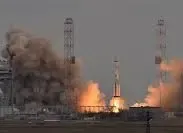Is Russia's Baikonur Launch Pad Facing Major Damage After Soyuz Mission?

Synopsis
Key Takeaways
- Baikonur launch pad damaged during Soyuz MS-28 mission.
- Concerns arise over Russia's human spaceflight capabilities.
- Repairs may take months to years to complete.
- Service cabin collapse poses a direct threat to future missions.
- The incident underscores the need for modern infrastructure.
Moscow, Nov 28 (NationPress) Russia's capacity to conduct crewed space missions has encountered a significant obstacle following extensive damage to a crucial launch pad at the Baikonur Cosmodrome during the Soyuz MS-28 mission to the International Space Station (ISS). This situation raises alarming concerns that Moscow could be temporarily unable to send humans into orbit for the first time in decades.
The Soyuz MS-28 spacecraft, which transported two Russian cosmonauts along with a NASA astronaut, successfully launched and docked with the ISS on November 27, 2025. Nevertheless, subsequent evaluations uncovered a severe failure on the ground. A movable service cabin, a vital structure that grants crew access to the Soyuz rocket, collapsed into the exhaust trench beneath the launch pad right after liftoff.
This service cabin is crucial for both crewed Soyuz missions and Progress cargo flights. Given that Baikonur is Russia's sole operational site for launching humans to the ISS, damage to this structure directly endangers the continuity of the nation's human spaceflight program.
Roscosmos has confirmed damage to several components of the launch infrastructure and stated that repair operations would commence promptly. The agency noted that spare parts are available; however, space analysts warn that restoring the facility could take several months up to two years, depending on structural assessments and safety evaluations.
Such a delay would effectively stall Moscow’s capacity to conduct crewed missions.
The Baikonur launch pad has been operational since the 1960s, marking this incident as an unprecedented disruption to Russia's space endeavors.
With the facility out of service, future Soyuz and Progress missions may face indefinite delays, prompting Moscow to potentially expedite the development of the Vostochny Cosmodrome or explore alternative international partnerships to ensure continued access to low-Earth orbit.
Despite the incident, Roscosmos has affirmed that the Soyuz MS-28 crew aboard the ISS is safe.
This occurrence underscores the increasing challenges of depending on aging Soviet-era infrastructure and highlights the geopolitical intricacies surrounding Baikonur, which is situated in Kazakhstan yet remains integral to Russia's space aspirations.









